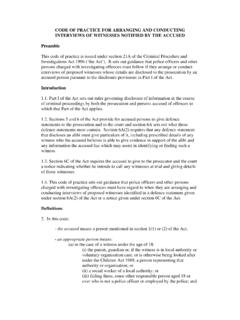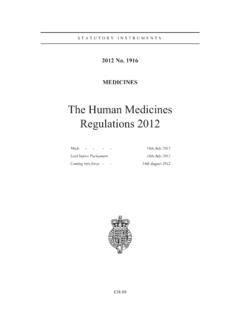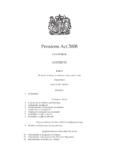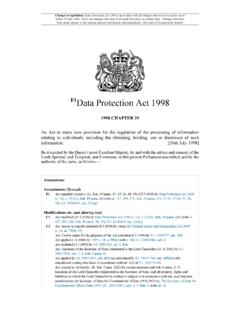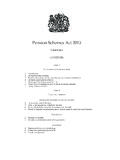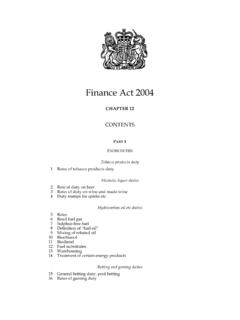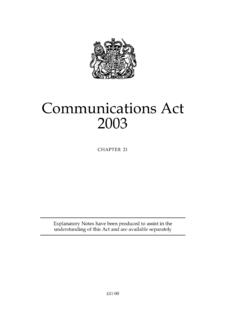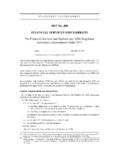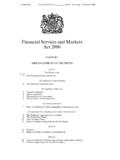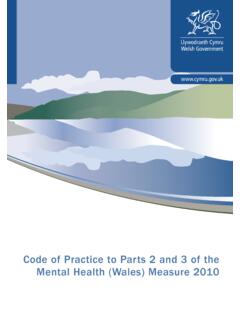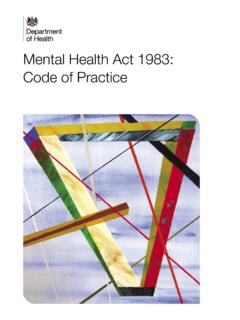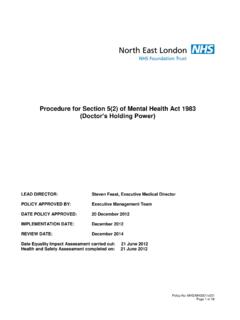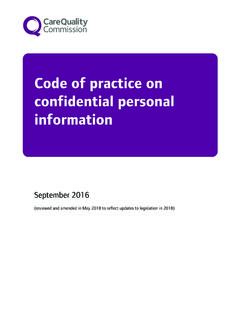Transcription of Code of Practice - Legislation.gov.uk
1 mental Capacity Act 2005 code of PracticeCode of PracticeMental Capacity Act 2005 code of PracticeIssued by the Lord Chancellor on 23 April 2007 in accordance with sections 42 and 43 of the ActLondon: TSOM ental Capacity Act 2005 Department for Constitutional AffairsPublished by TSO (The Stationery Office) and available from:Online , Telephone, Fax & E-mailTSOPO Box 29, Norwich NR3 1 GNTelephone orders/General enquiries: 0870 6005522 Fax orders: 0870 600 5533 E-mail: Textphone: 0870 240 3701 TSO Shops123 Kingsway, London WC2B 6PQ020 7242 6393 Fax 020 7242 639416 Arthur Street, Belfast BT1 4GD028 9023 8451 Fax 028 9023 540171 Lothian Road, Edinburgh EH3 9AZ0870 606 5566 Fax 0870 606 5588 TSO@Blackwell and other Accredited Agents Crown Copyright 2007 First published 2007 ISBN 978 0 11 7037465 Published by The Stationery Office on behalf of the Department for Constitutional in the United Kingdom for The Stationery may re-use this document/publication (not including the Royal Arms and other departmental or agency logos)
2 Free of charge in any format or medium. You must re-use it accurately and not in a misleading context. The material must be acknowledged as Crown copyright and you must give the title of the source document/publication. Where we have identified any third party copyright material you will need to obtain permission from the copyright holders document/publication can also be viewed on our website at: enquiries regarding this document/publication should be sent to us at:The Public Guardianship OfficeArchway Tower2 Junction RoadLondonN19 5SZ0845 330 2900 Foreword by Lord FalconerThe mental Capacity Act 2005 is a vitally important piece of legislation, and one that will make a real difference to the lives of people who may lack mental capacity.
3 It will empower people to make decisions for themselves wherever possible, and protect people who lack capacity by providing a flexible framework that places individuals at the very heart of the decision-making process. It will ensure that they participate as much as possible in any decisions made on their behalf, and that these are made in their best interests. It also allows people to plan ahead for a time in the future when they might lack the capacity, for any number of reasons, to make decisions for themselves. The Act covers a wide range of decisions and circumstances, but legislation alone is not the whole story.
4 We have always recognised that the Act needs to be supported by practical guidance, and the code of Practice is a key part of this. It explains how the Act will operate on a day-to-day basis and offers examples of best Practice to carers and practitioners. Many individuals and organisations have read and commented upon earlier drafts of the code of Practice and I am very grateful to all those who contributed to this process. This code of Practice is a better document as a result of this input. A number of people will be under a formal duty to have regard to the code : professionals and paid carers for example, or people acting as attorneys or as deputies appointed by the Court of Protection.
5 But for many people, the most important relationships will be with the wide range of less formal carers, the close family and friends who know the person best, some of whom will have been caring for them for many years. The code is also here to provide help and guidance for them. It will be crucial to the code s success that all those relying upon it have a document that is clear and that they can understand. I have been particularly keen that we do all we can to achieve code of Practice will be important in shaping the way the mental Capacity Act 2005 is put into Practice and I strongly encourage you to take the time to read and digest Falconer of ThorotonForeword by Lord Falconer, Secretary of State for Constitutional Affairs and Lord Chancellor1 The mental Capacity Act 2005, covering England and Wales, provides a statutory framework for people who lack capacity to make decisions for themselves.
6 Or who have capacity and want to make preparations for a time when they may lack capacity in the future. It sets out who can take decisions, in which situations, and how they should go about this. The Act received Royal Assent on 7 April 2005 and will come into force during legal framework provided by the mental Capacity Act 2005 is supported by this code of Practice (the code ), which provides guidance and information about how the Act works in Practice . Section 42 of the Act requires the Lord Chancellor to produce a code of Practice for the guidance of a range of people with different duties and functions under the Act.
7 Before the code is prepared, section 43 requires that the Lord Chancellor must have consulted the National Assembly for Wales and such other persons as he considers appropriate. The code is also subject to the approval of Parliament and must have been placed before both Houses of Parliament for a 40-day period without either House voting against it. This code of Practice has been produced in accordance with these code has statutory force, which means that certain categories of people have a legal duty to have regard to it when working with or caring for adults who may lack capacity to make decisions for themselves.
8 These categories of people are listed should the code of Practice be used?The code of Practice provides guidance to anyone who is working with and/or caring for adults who may lack capacity to make particular decisions. It describes their responsibilities when acting or making decisions on behalf of individuals who lack the capacity to act or make these decisions for themselves. In particular, the code of Practice focuses on those who have a duty of care to someone who lacks the capacity to agree to the care that is being is the code of Practice for?The Act does not impose a legal duty on anyone to comply with the code it should be viewed as guidance rather than instruction.
9 But if they have not followed relevant guidance contained in the code then they will be expected to give good reasons why they have departed from Capacity Act code of Practice2323 Certain categories of people are legally required to have regard to relevant guidance in the code of Practice . That means they must be aware of the code of Practice when acting or making decisions on behalf of someone who lacks capacity to make a decision for themselves, and they should be able to explain how they have had regard to the code when acting or making categories of people that are required to have regard to the code of Practice include anyone who is.
10 An attorney under a Lasting Power of Attorney (LPA) (see chapter 7) a deputy appointed by the new Court of Protection (see chapter 8) acting as an Independent mental Capacity Advocate (see chapter 10) carrying out research approved in accordance with the Act (see chapter 11) acting in a professional capacity for, or in relation to, a person who lacks capacity working being paid for acts for or in relation to a person who lacks last two categories cover a wide range of people. People acting in a professional capacity may include: a variety of healthcare staff (doctors, dentists, nurses, therapists, radiologists, paramedics etc) social care staff (social workers, care managers, etc) others who may occasionally be involved in the care of people who lack capacity to make the decision in question, such as ambulance crew, housing workers, or police who are being paid for acts for or in relation to a person who lacks capacity may include.
